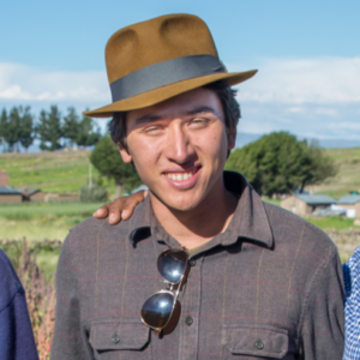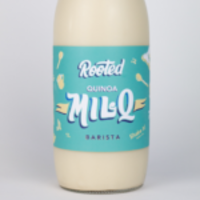Alexander Wankel, founder of Rooted Quinoa MilQ

Alexander is the founder of a startup that creates milk-free “MilQ” made with peruvian quinoa. His company Rooted (now muyumilq) believes that good foods should support healthy ecosystems and thriving people. That’s why they source ancient crops at fair prices from smallholder farmers in the Andes.
What is your background? What made you decide to become an entrepreneur?
As an undergrad I loved anthropology but I wanted to experience what I had read about firsthand. This combined with my Peruvian heritage inspired me to move to the rural Andes. I found jobs in fair trade and microfinance where I gradually learned about building ethical supply chains for Andean smallholders. I realised that many farmers aspire to improve their own lives through business and so I began to see social entrepreneurship as part of the solution.
What is your definition of entrepreneurship?
Entrepreneurship is the potential to create change in the world by building a business, however large or small. This requires a willingness to take action towards a desired future in spite of risks and uncertainty. Peru is full of micro-entrepreneurs and their admirable work ethic is an inspiration for my own work.

Andean civilisations developed some of the healthiest, most planet-friendly, and most diverse foods in the world. However, indigenous farmers today often live in poverty while native crops vanish and are replaced by “modern” commercial ones.
Quinoa in Peru began disappearing in colonial times, but experienced a revival due to global demand in the 21st century. Smallholders experienced high prices and improved livelihoods until prices crashed in 2015. Around that time, I began thinking about how to build a profitable business that can improve the incomes of conservationist farmers who preserve local biodiversity. This gave me the idea of creating MilQ – a beverage made with native quinoa purchased at fair prices.
I began purchasing quinoa from a women’s farming association in southern Peru and started making quinoa “milk” and selling it at farmers markets in Lima. After building a loyal customer base, I realised that the idea had real potential and could be scaled into a global business. Quinoa consumes 30x less water than almonds, contains complete proteins, and is adapted to harsh mountain climates. It seemed like the perfect milk alternative for a climate change future.
What would you say are the top 3 skills that needed to be a successful entrepreneur? Why?
As a social entrepreneur, I believe the most important qualities are mindful leadership, adaptability, and purpose.
Mindful leadership is important because founders face unexpected problems on a regular basis. It is easy to use up limited mental and emotional resources during the challenging early years of a startup. A founder’s internal life influences their decision making, as well as the decisions of others around them. Being present and listening well can lead to better decisions and bring out the best in others.
Adaptability means having a constant openness to new learnings and a willingness to make changes based on what is best for all stakeholders. A founder should be attached to their vision, but not too attached to the current version of the plan.
Purpose provides the raw materials for motivation and persistence. This is essential because ideas can take many years to come to life. A founder has to be so in love with the problem they are trying to solve that they will persist through problems and delays.
What is your favourite part of being an entrepreneur?
For me it is the chance to explore a unique and untapped potential, or the awareness that if I weren’t executing this idea most likely no one would.
What individual, company or organization inspires you most? Why?
Maxima Acuña is one of the most visible environmental activists in Peru who and has defended land rights. She is a subsistence farmer who defended her home when Newmont Mining attempted to build an open pit mine without local people’s consent. As a result, she was beaten until she became unconscious and her home was destroyed by security forces. Undeterred, her ongoing contributions to local environmental movements earned her the Goldman Environmental Prize.
If you had 5 minutes with the above individual/ company/organization, what would you want to ask or discuss?
I would ask what the current obstacles are for Andean farmers attempting to defend their basic rights. I would also ask about the festivals in her local community.
What has been your most satisfying or successful moment in business?
I feel satisfied knowing that what I am doing is part of a plant-based and biodiversity friendly food movement which, in spite of everything happening in the world, continues to be a long-term positive force. Seeing people enjoy MilQ is a tangible reminder of all that is possible.
What would you say have been some of your mistakes, failures or lessons learned as an entrepreneur?
When I first had this idea, I underestimated how long it would take to really scale this to a level where it could have a significant impact. I also had a lot to learn to become a leader who can help others thrive. Over time, I’ve learned the importance of positive, mutual relationships in every aspect of business. This has been especially true during the pandemic as contacts built up over the years made it possible to move activities forward in spite of unprecedented disruptions.
How have you funded your ideas?
I am funding the UK launch of MilQ with a research grant from the Just Imagine If competition as well as angel investment. I funded the MilQ launch in Peru through a Kickstarter campaign, seed funding from the Wild Gift Foundation fellowship program, and product sales.
Are there any sector-specific awards/grants/competitions that have helped you?
The Skoll Centre allowed me to move to the UK on a full scholarship to complete my MBA studies at Oxford. The Just Imagine If competition run by food entrepreneur Paul Lindley provided us with a £75,000 research grant which is allowing us to perfect and scale up the manufacturing process for MilQ so that we can enter major retailers.
What is good about being an entrepreneur in Oxfordshire? Bad?
I find the city inspiring and enjoy being close to students and alumni, some of whom are entrepreneurs themselves and have helped shape my ideas. There are networks here which can be helpful for seeking advisers or raising investment. However, the startup ecosystem here is more suited for tech and health related entrepreneurship which doesn’t always fit in our case, as a consumer goods brand. For the purposes of launching MilQ, it helps to be based in this vibrant town full of open minded people as we test our idea in the UK for the first time.
If a new entrepreneur or startup came to you looking for entrepreneurship resources, where would you send them?
I would recommend signing up for Enterprising Oxford’s updates or checking out resources at the Foundry.
Any last words of advice?
If you are considering entrepreneurship, be prepared to commit many years of your life to it and remember to take excellent care of yourself as a person so that you can contribute your best.
Share this
More news



